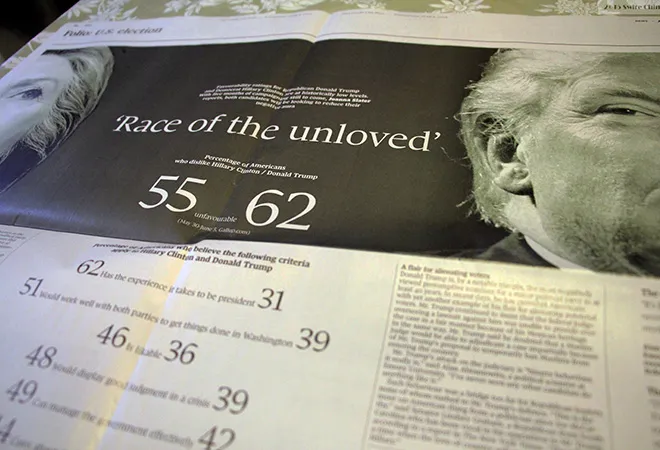-
CENTRES
Progammes & Centres
Location
In every case a measure of balance is essential. However, while considering America, structural difference must be kept in mind. Russia, unlike the US, does not have a natural safety lock.

This is the second part in the series Russian Dossiers.
Read the first part | SCO Summit: A Russian perspective
The struggle against external influence is emerging as a trend across the globe. Appropriately, it is the mightiest and most influential state on the planet — the US — that is setting the tone.
The campaign to find "Russian tracks" which leads to President Donald Trump has acquired an unprecedented scale.
The situation is instructive. For us in Russia it is useful to look into the mirror and observe from outside what the paranoia which envelops the political class looks like, and how the hunt for external enemies and their internal accomplices appears. Traditionally Russia has seen similar examples, maybe not this intense (though there have been worse) but identically structured. To understand how this is perceived by those not involved directly in the process — see and compare.
Russia is not immune to these trends — last week it was announced that the Federation Council (Upper House of Parliament) was creating a commission against interference in internal affairs. The authors do not deny that the main catalyst for this was the (forthcoming) election campaign — a time of extreme fragility of sovereign political systems as the experience of post-Soviet countries has shown.
Raising the question of minimising external influence is not at all absurd. First, competition between great states is an integral part of international relations, trying to influence an opponent in different ways, including its internal affairs is common. Second, given the dictatorship of communication technologies, total transparency and interdependence, the fine line between internal and external is being erased. External factors become components of internal life and whether someone is trying to consciously use them for their benefit or the impact of the surrounding environment is chaotic/spontaneous in nature.
Parallels in Russian and US efforts might be perceived in different ways but there is one significant distinction which should not be forgotten. No matter how prevalent the witch-hunt in the USA becomes, however much external factors are used to deal with internal problems, the USA is not going to isolate itself from the world.
There are objective reasons for that: US is a hegemonic country whose power depends on its ability to regulate global processes and extract benefits from them.
The fact that the US is the world largest magnet/vacuum cleaner for brains and money, serves as a guarantor for the country's successful development — a fact even the most obstinate isolationist will not deny. He can try to change the rules of the game, like Trump does, for the benefit of America, but isolating the country from the world would undermine the essence of its development.
Russia is a different story. The country is not a powerful magnet, its involvement in international affairs is limited to the military and natural resources. Its self-preservation instincts, if not contained, are unlimited and ideally there is a tendency to isolationism especially given that the country has seen periods of isolation and self-sufficiency. Today, however, intellectual, technological and as a result, socio-economic rise is impossible without interaction and exchanges with the external world. Internal potential cannot be attained in isolation. Simplistically put — restricted originality leads to degradation. This, in turn, undermines the main purpose for setting protective measures: the country weakens, falls behind, becomes an even easier target for external influence.
In every case a measure of balance is essential. However, while considering the American example, the structural difference must be kept in mind. Russia, unlike the US, does not have a natural safety lock which would prevent throwing away the baby along with the bathwater. It has to look after the baby very carefully.
The author is Chief Editor of Russia in Global Affairs.
This article first appeared in Russian in Kommersant newspaper, and has been reprinted courtesy Kommersant.
Translation from Russian to English is by Mariia Bobyleva.
The views expressed above belong to the author(s). ORF research and analyses now available on Telegram! Click here to access our curated content — blogs, longforms and interviews.